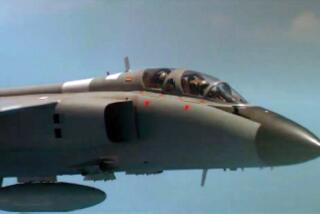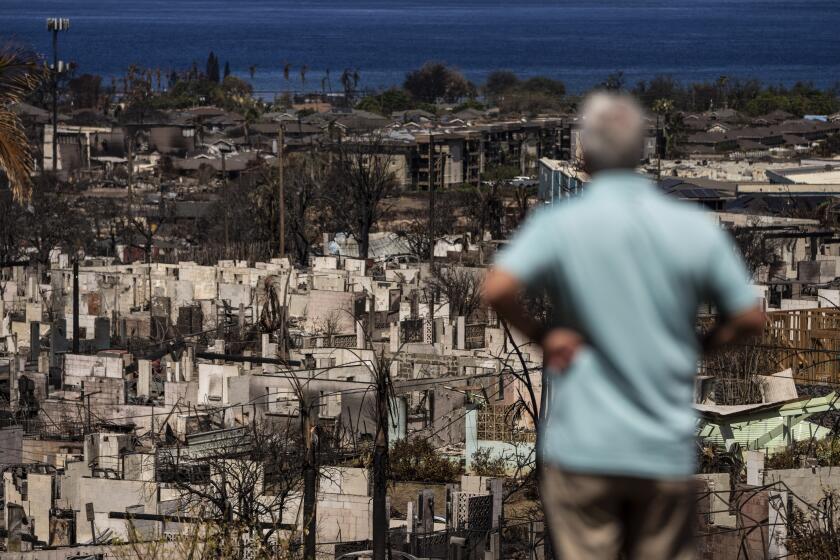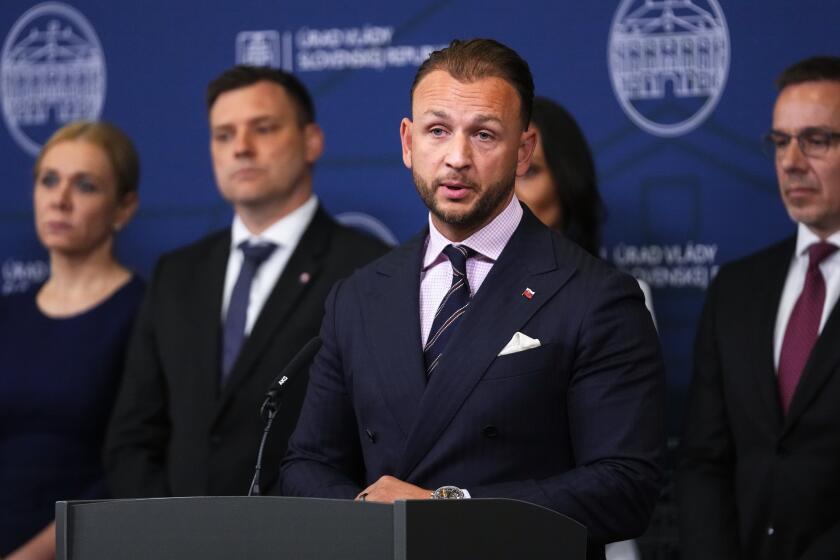Bush, Jiang Vow to Build a ‘Mature’ Relationship
Meeting in person for the first time, President Bush and Chinese President Jiang Zemin pledged Friday to build a “mature” relationship based on common interests that would supersede the array of sensitive issues bedeviling their two nations.
After meeting for more than three hours here, Bush and Jiang in effect turned over a new leaf in Sino-U.S. relations. Most notably, neither leader mentioned the April spy plane incident that severely strained relations between the two nations.
“Both sides believe that this is an incident that is behind us and that we can move on to constructive relations,” a senior Bush administration official said afterward.
Although the two presidents exchanged letters shortly after Bush’s inauguration, they did not talk until after the spy plane incident had been resolved. The crisis began when a Chinese fighter jet collided with a U.S. reconnaissance plane over international waters south of China. After the U.S. plane made an emergency landing on China’s Hainan island, authorities held its crew for 11 days.
On Friday, the leaders agreed to telephone each other the next time a crisis or misunderstanding arises between Washington and Beijing.
Briefing reporters here Friday, the administration official called Bush’s commitment to build on his personal relationship with Jiang “a very important step forward.”
“Today’s meetings convinced me that we can build on our common interests,” Bush said at a midday news conference with Jiang.
“Two great nations will rarely agree on everything; I understand that,” Bush said. “But I assured the president that we’ll always deal with our differences in a spirit of mutual respect. We seek a relationship that is candid, constructive and cooperative.”
Jiang echoed those sentiments.
“China and the United States are different in their national conditions, so it’s normal that there are certain disagreements between us,” he said.
“So long as both sides respect each other, treat each other with sincerity, enhance trust through frequent exchange of views, then the disagreements can get addressed properly,” Jiang added.
Both presidents also suggested that a shared goal of combating terrorism has turned China and the United States into virtual allies, at least for now.
Referring to the U.S.-led counter-terrorism campaign, Jiang said: “China attaches importance to its relations with the United States and stands ready to make joint efforts with the U.S. side to develop a constructive and cooperative relationship.”
But Jiang also expressed the hope that the campaign “can have clearly defined targets . . . and also avoid innocent casualties.”
In turn, Bush praised China’s response to the Sept. 11 terrorist attacks on America, saying that China had “responded immediately.”
The senior Bush administration official said China had been “very helpful on the intelligence and information [sharing] front” and had sealed its border with Afghanistan, the base of suspected terrorist Osama bin Laden.
“We feel that we’ve gotten full and complete support from China,” the official said.
During wide-ranging talks, Bush and Jiang discussed stability on the Korean Peninsula and a bilateral trade dispute over soybeans. With the aid of interpreters, the two presidents conversed throughout lunch, although Jiang often opened and ended his remarks with brief English phrases, according to Karen Hughes, counselor to Bush.
At one point, as he spoke of religious freedom, Bush told Jiang that “as a practicing Christian,” he “values . . . the right to personal faith,” according to the senior Bush aide.
Bush and Jiang also exchanged their well-known views on Taiwan, which China considers a renegade province that should not be treated as a separate political entity.
“The president reaffirmed very strongly his commitment to the Taiwan Relations Act,” which commits the United States to help Taiwan defend itself, the senior aide said.
Bush told reporters that he had “explained my views on Taiwan and preserving regional stability in East Asia.”
But Jiang was more pointed, saying, “So long as the problems between us, especially the problem of Taiwan, the question of Taiwan, is properly addressed, then there will be a bright future of our relationship.”
Although the senior Bush administration official said the two leaders had established a “good personal basis for moving forward,” the depth of their mutual affinity remains to be tested.
Bush’s post-summit remarks about Jiang, for instance, were conspicuously devoid of the hyperbole he used in describing his tete-a-tete with Russian President Vladimir V. Putin after their initial meeting in June near Ljubljana, Slovenia.
That session lasted just under two hours, and Bush told reporters afterward: “I was able to get a sense of his soul--a man deeply committed to his country and the best interests of his country.”
Bush and Putin are scheduled to meet here Sunday. Both are in Shanghai to attend the annual meeting of the Asia-Pacific Economic Cooperation forum, an organization of 21 Pacific Rim economies.
Today, Bush is scheduled to address business executives attending the APEC meeting. He will contrast “the values shared by the civilized world” with the “dark view” of the world held by terrorists, according to Hughes.
Although Bush ended his public schedule here by 4 p.m. Friday, Hughes said the president would work well into the night. Bush planned to tape his weekly Saturday radio address, polish his speech to executives, dine with some APEC delegates in his hotel suite and then hold more staff meetings.
On Thursday, Bush held a national security meeting via videoconference and also met with South Korean President Kim Dae Jung.
More to Read
Start your day right
Sign up for Essential California for news, features and recommendations from the L.A. Times and beyond in your inbox six days a week.
You may occasionally receive promotional content from the Los Angeles Times.






